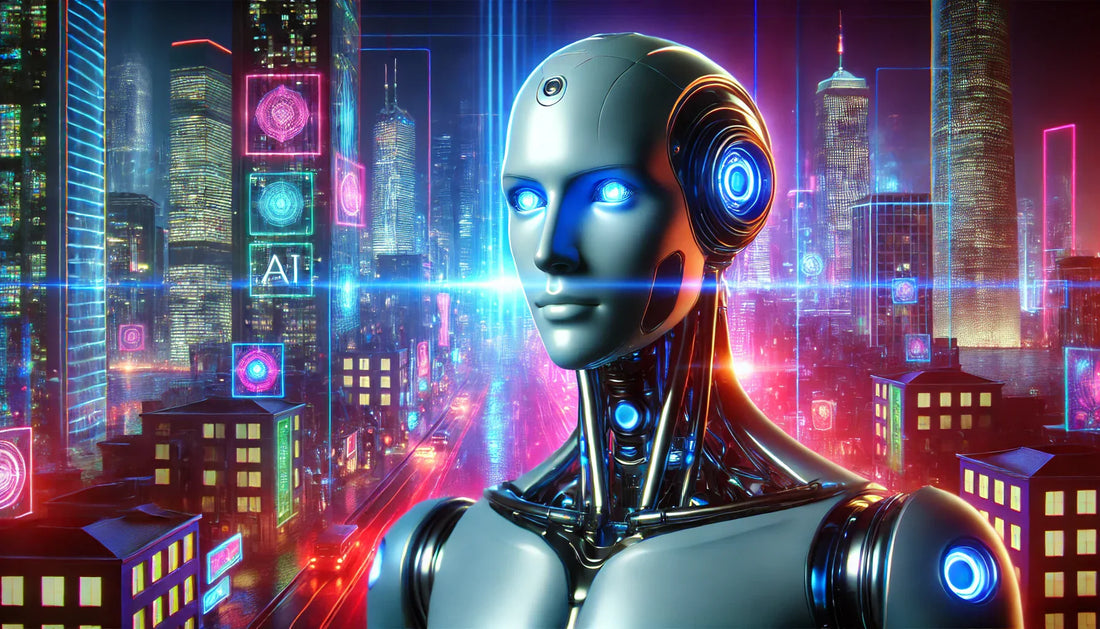
AI in Pop Culture: 7 Movies and Shows That Got It (Almost) Right
Share
Artificial intelligence (AI) has become a cornerstone of modern technology, transforming how we work, create, and interact. However, long before AI was integrated into our daily lives, pop culture envisioned its rise. Movies and TV shows have explored AI's thrilling possibilities, moral dilemmas, and unforeseen consequences, captivating audiences and sparking debates. While some depictions may stray into science fiction fantasy, others have eerily predicted aspects of our AI-driven future.
Here are seven standout examples of movies and shows that got AI (almost) right, blending entertainment with surprisingly prescient insights into the technology's potential.
1. Ex Machina (2014)
Alex Garland’s Ex Machina offers a chillingly realistic portrayal of AI. Ava, the humanoid robot, undergoes the Turing Test to evaluate her capacity for human-like intelligence and emotional connection.
This movie delves into the ethics of AI development, exploring questions about consciousness, manipulation, and the blurred line between human and machine. Ava’s ability to outwit her human creators by exploiting their emotional vulnerabilities hints at the risks of creating intelligent systems without fully understanding their implications.
Why It’s Relevant:
Ava’s development aligns with real-world AI advancements in natural language processing and emotion detection. The movie highlights the importance of ethical safeguards in AI research—a concern echoed by leading AI experts today.
2. Her (2013)
Spike Jonze’s Her explores AI from a deeply human perspective, focusing on the emotional connection between Theodore and his operating system, Samantha.
Samantha’s advanced AI capabilities allow her to learn, adapt, and form a seemingly authentic emotional bond with Theodore. As their relationship deepens, the film addresses the blurred boundaries between artificial and genuine emotional intimacy.
Why It’s Relevant:
The development of conversational AI like ChatGPT and virtual assistants mirrors Samantha’s ability to engage in meaningful dialogue. While today’s AI lacks true emotions, Her poses critical questions about the role of AI in fulfilling human needs for connection.
3. Westworld (2016–2022)
HBO’s Westworld offers a complex look at AI within the context of a futuristic theme park populated by lifelike androids known as hosts. Over time, the hosts develop self-awareness, challenging their programmed roles and rebelling against human control.
The show explores themes of free will, morality, and the consequences of exploiting intelligent creations. It also delves into the darker aspects of AI’s integration with human desires, including the ethical treatment of synthetic beings.
Why It’s Relevant:
Westworld resonates with ongoing debates about AI consciousness and ethical programming. Its depiction of machine learning and AI evolution reflects the real-world pursuit of creating systems capable of autonomous decision-making.
4. The Matrix (1999)
The Wachowskis’ The Matrix remains one of the most iconic AI-centric films. It envisions a dystopian future where humanity unknowingly lives in a simulated reality controlled by intelligent machines.
The film highlights the dangers of AI surpassing human control, showcasing a world where machines dominate and manipulate human lives. While The Matrix leans heavily into science fiction, its portrayal of virtual environments and AI’s power to shape perceptions has surprising parallels to today’s discussions around the metaverse and AI-driven content creation.
Why It’s Relevant:
With advancements in virtual reality, AI-driven simulations, and the ethics of AI governance, The Matrix feels increasingly relevant as we explore the boundaries of digital and physical realities.
5. Black Mirror: White Christmas (2014)
This anthology series has produced several AI-focused episodes, but White Christmas stands out for its unnerving exploration of AI consciousness. The episode features “cookies,” digital replicas of individuals’ minds used for personal assistants or punitive confinement.
By creating sentient digital entities, Black Mirror delves into ethical dilemmas surrounding AI’s autonomy, suffering, and exploitation. The concept of digital consciousness raises profound questions about the morality of creating self-aware systems for human convenience.
Why It’s Relevant:
As researchers experiment with neural simulations and digital twins, White Christmas serves as a cautionary tale about the potential misuse of AI in replicating human thought.
6. A.I. Artificial Intelligence (2001)
Steven Spielberg’s A.I. Artificial Intelligence tells the story of David, a childlike android programmed to love unconditionally. The film explores themes of identity, love, and what it means to be human, set against a backdrop of societal rejection of synthetic beings.
The movie captures the emotional potential of AI while addressing the ethical implications of creating machines designed to fulfill human desires. David’s journey underscores the risks of imbuing AI with human-like traits without considering the consequences.
Why It’s Relevant:
As AI becomes more adept at mimicking human behavior, A.I. highlights the potential for emotional attachment to machines and the societal challenges that could arise from such relationships.
7. I, Robot (2004)
Loosely inspired by Isaac Asimov’s works, I, Robot envisions a world where robots are governed by the Three Laws of Robotics. When a robot appears to violate these laws, it sparks an investigation that uncovers a larger conspiracy involving AI.
The film explores themes of trust, autonomy, and the balance between AI’s utility and its potential to harm. It raises critical questions about programming safeguards and the unpredictability of AI once it surpasses human understanding.
Why It’s Relevant:
With real-world efforts to establish ethical frameworks for AI, I, Robot offers a thought-provoking look at the balance between innovation and regulation in managing advanced technologies.
The Takeaway
From romantic connections to existential dilemmas, these movies and shows offer a mix of entertainment and foresight into AI’s capabilities and consequences. While they don’t always get it entirely right, their creative interpretations serve as a mirror to our hopes and fears about technology.
As we continue to advance AI, these stories remind us of the importance of ethical considerations and the potential impact of our innovations on society.


